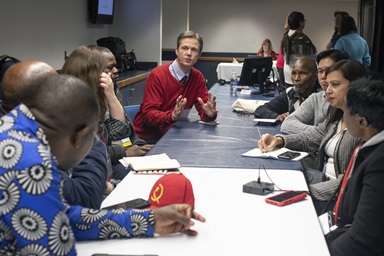The United Methodist Church’s top court will hear an appeal next month of a decision to reinstate a pastor who had lost his ministerial credentials after performing a same-sex marriage ceremony for his son.
The appeal involving the Rev. Frank Schaefer, which provoked national media attention, is one of 21 docket items under consideration when the United Methodist Judicial Council meets Oct. 22-25 at the Marriott Courtyard Downtown in Memphis, Tennessee.
After a hearing in June, the denomination’s Northeastern Jurisdictional Committee on Appeals restored Schaefer’s credentials and ordered the Eastern Pennsylvania Annual (regional) Conference to compensate Schaefer for all lost salary and benefits dating from Dec. 19, 2013.
The Rev. Christopher Fisher, who served as counsel for the church, has appealed that decision to the Judicial Council. The appeal contends the decision was at odds with the 2012 United Methodist Book of Discipline, the denomination’s lawbook, and previous Judicial Council rulings.
At Fisher’s request, the Judicial Council has granted an oral hearing on the matter on Wednesday, Oct. 22.
Second oral hearing
The council also has agreed to an oral hearing request, scheduled the same day, from the denomination’s Western Pennsylvania Annual (regional) Conference. That hearing is related to a petition filed by the conference asking for a “declaratory decision” about Book of Discipline guidelines regarding the process for the review and dismissal of a complaint against a bishop.
Two years ago, the conference, which raised about $90,000 for church projects in Uganda, had asked the Judicial Council to rule whether funds given to the East Africa Conference were used in accordance with the intent of the donors as required by Paragraph 258.4 of the 2008 Book of Discipline.
The money had been sent to current Bishop Daniel Wandabula, who was then a district superintendent and project coordinator. In November 2012, the denomination’s finance agency lowered the bishop’s salary because of issues raised by financial audits conducted by the United Methodist Board of Global Ministries.
In April 2013, Judicial Council ruled that Wandabula should pay $3,000 owed to a pastor in South Sudan, but took no other action because it found there was no evidence the complaint process regarding Wandabula had concluded.
Review of sexuality resolutions
Also on the October docket are reviews of decisions of law from bishops on annual conference resolutions related to sexuality.
Bishop Sudarshana Devadhar ruled that a 2014 New England Annual Conference resolution urging a change in denominational policy toward same-sex marriage and an openness to all couples wanting to marry “is thoroughly aspirational in nature” and does not break church mandates.
Bishop Deborah L. Kiesey declared that language in a 2014 Detroit Annual Conference resolution to support lay members who chose same-sex marriage was aspirational, depending on the type of support. But she ruled “null and void” the call to stop filing complaints against those accused of violating church law or enforcing those laws.
Bishop Sally Dyck ruled a 2014 Northern Illinois Annual Conference resolution on marriage equality is “an historical and aspirational statement without prescriptive force which does not specifically negate, ignore or violate provisions of the Discipline.”
Bishop Marcus Matthews declared that the process used by the Baltimore-Washington Annual Conference “to vote on the five human sexuality resolutions was lawful and did not violate the Discipline.” He also ruled that one of those resolutions, entitled "Agree to Disagree on Issues Pertaining to Gender and Sexual Minorities," is aspirational and does not violate church law.
Change in council members
At its April meeting, the Judicial Council amended its “Rules of Practice and Procedure” to maintain the proper balance of lay and clergy, as required by the Book of Discipline. If a council member’s category changes from lay to clergy or clergy to lay, that member's position would be declared vacant.
Several such changes have occurred. Council vice president Angela Brown, who was elected and served as a layperson but was commissioned as clergy at the 2014 California-Nevada Annual Conference, has resigned. She is succeeded by Sandy Lutz of Canton, Ohio, the first lay alternate.
Kurt Glassco, another lay alternate, has been appointed as a local pastor in the Oklahoma Annual Conference, thus changing his category to clergy. Randall Miller of Oakland, California, is the new first lay alternate.
Two clergy alternate positions also have changed. The Rev. Susan Henry-Crowe resigned after becoming the top executive of the United Methodist Board of Church and Society and the Rev. Jane Tews is now deceased.
The entire October 2014 docket for the Judicial Council can be found here.
*Bloom is a United Methodist News Service multimedia reporter based in New York. Follow her at http://twitter.com/umcscribe or contact her at (646) 369-3759 or [email protected].
Like what you're reading? Support the ministry of UM News! Your support ensures the latest denominational news, dynamic stories and informative articles will continue to connect our global community. Make a tax-deductible donation at ResourceUMC.org/GiveUMCom.




